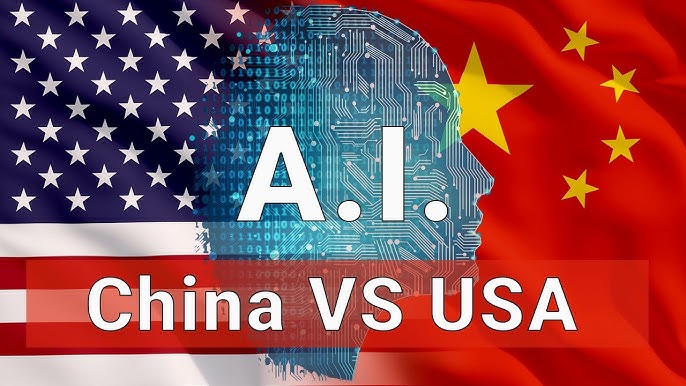The AI arms race is not just about faster chips or smarter algorithms it’s about who will shape the world’s economic, military, and political order for decades to come. Today, the United States maintains a lead in artificial intelligence research, development, and deployment.
Yet, cracks are appearing in its advantage, and China’s relentless pursuit of AI supremacy threatens to tilt the balance. The stakes are enormous in the coming years, whichever nation dominates artificial intelligence could dictate the rules of the global game. The AI arms race is fundamentally a contest of strategic vision and sustained investment.
As artificial intelligence powers everything from autonomous weapons to predictive healthcare, nations see AI not just as a tool, but as a pillar of national security and global influence. In this race, speed matters but so does the ability to scale innovations across military, commercial, and civic domains.
President Donald Trump’s administration has rolled back several policies aimed at restricting China’s access to US technology. While these moves are intended to open markets, they may inadvertently accelerate Beijing’s progress. China has already outlined aggressive plans to dominate the AI sector by 2030, and it’s using a state backed model to ensure rapid scaling.
China’s Strategic Advantage
China’s model for AI development is different from America’s fragmented, private sector driven approach. The Chinese government coordinates universities, tech giants like Baidu, Alibaba, and Tencent, and military agencies under a unified national strategy.
This wholebofbnation approach accelerates research and ensures AI innovations can quickly move from labs to real world deployment. In 2023, China unveiled an AI powered surveillance network capable of identifying individuals in real time across cities.
Within months, the same underlying algorithms were adapted for autonomous drones in the military. This level of technology transfer between sectors is far more seamless in China than in the US, where private companies often resist working with the Pentagon.
Weak Points in the US Strategy
The US may lead in AI innovation, but it struggles with policy consistency. Changes in administration often mean abrupt shifts in funding priorities and export controls. Without a clear, bipartisan AI strategy, America risks undermining its own advantage.
Dr. Michael Horowitz, a leading scholar in defense innovation, warns that America’s strength in AI comes from its private sector and research universities, but without coordinated policy support, these assets can’t be fully leveraged against a state driven competitor like China.
Additionally, the US faces bottlenecks in semiconductor manufacturing. While companies like NVIDIA design world class AI chips, production heavily depends on Taiwan a vulnerability in the event of geopolitical instability.
Military Implications of Losing the Lead
Artificial intelligence is transforming warfare. From autonomous submarines to AI driven cyber defense, the country that masters these tools first gains a strategic military edge. If the US loses the AI arms race, China could integrate AI into its military doctrines faster, potentially offsetting America’s traditional advantages in naval power, air dominance, and intelligence gathering.
The People’s Liberation Army (PLA) has been testing AI assisted decision making systems that can simulate war scenarios millions of times faster than human planners. In contrast, the US military is still navigating ethical debates over autonomous weapons, slowing deployment.
Beyond military power, the AI arms race will shape the global economy. AI driven industries from smart manufacturing to personalized medicine will define the next wave of economic growth. If China captures the lead, it could set technical standards, control supply chains, and dominate data driven markets.
Personal Perspective: I spoke to a Silicon Valley AI entrepreneur who has worked in both the US and China. In China, there’s a level of urgency I don’t see in the States, he said. Funding decisions happen overnight, regulations adapt quickly, and there’s no hesitation in scaling risky AI models. In the US, bureaucracy slows everything down.
The Role of Artificial General Intelligence
Looking further ahead, the race could hinge on artificial general intelligence (AGI) AI systems capable of human level reasoning across multiple tasks. The first country to develop AGI would gain unmatched technological and geopolitical leverage.
China’s centralized approach and massive datasets could give it a head start, especially if US policies allow Chinese firms to access cutting edge American research.
To avoid losing the AI arms race, the US must take several urgent steps. Bipartisan policy is crucial to ensure continuity across administrations. Reduce reliance on foreign manufacturing, particularly in geopolitically sensitive regions.
Encourage responsible collaboration between tech companies and the Department of Defense. Expand funding for STEM education, research fellowships, and immigration pathways for top AI researchers. Establish global AI governance frameworks that reflect democratic values, ensuring technology is used responsibly.
Former Google CEO Eric Schmidt, who chaired the US National Security Commission on AI, has repeatedly warned that America cannot afford complacency China is not slowing down, and neither should we.
The AI arms race is more than a technological contest it’s a battle over the future world order. The US still holds a lead in innovation, but its fragmented strategy and policy inconsistencies could hand the advantage to China.
In great power competition, second place doesn’t just mean fewer patents it means less influence, less security, and less control over the rules that shape the 21st century.
If Washington fails to act decisively, it could wake up one day to find the AI race already lost and with it, the ability to set the terms of global power.
